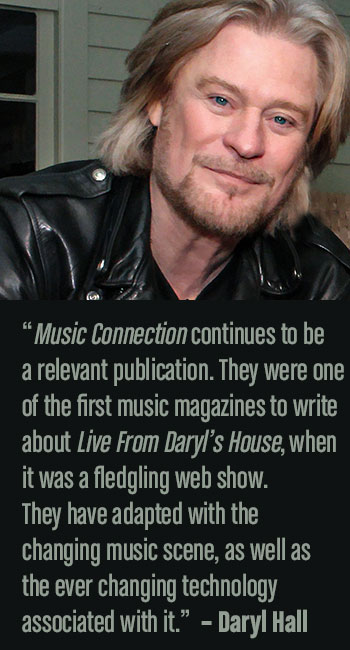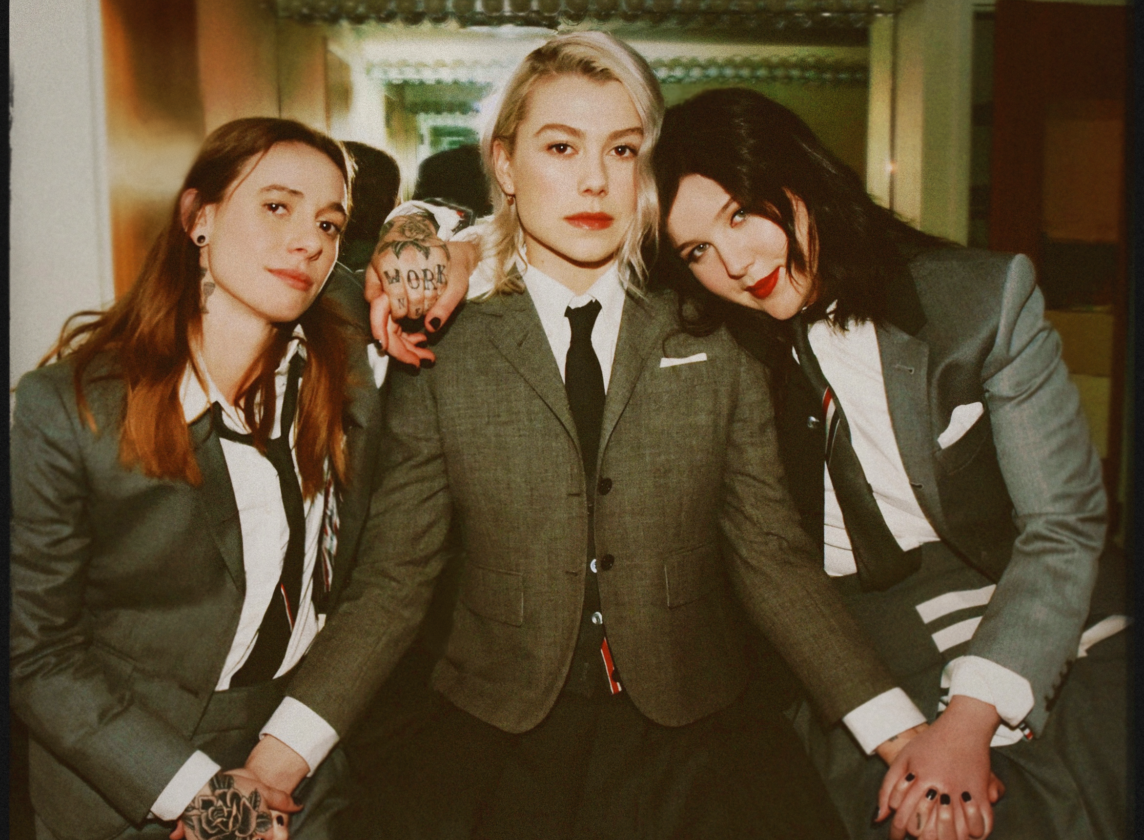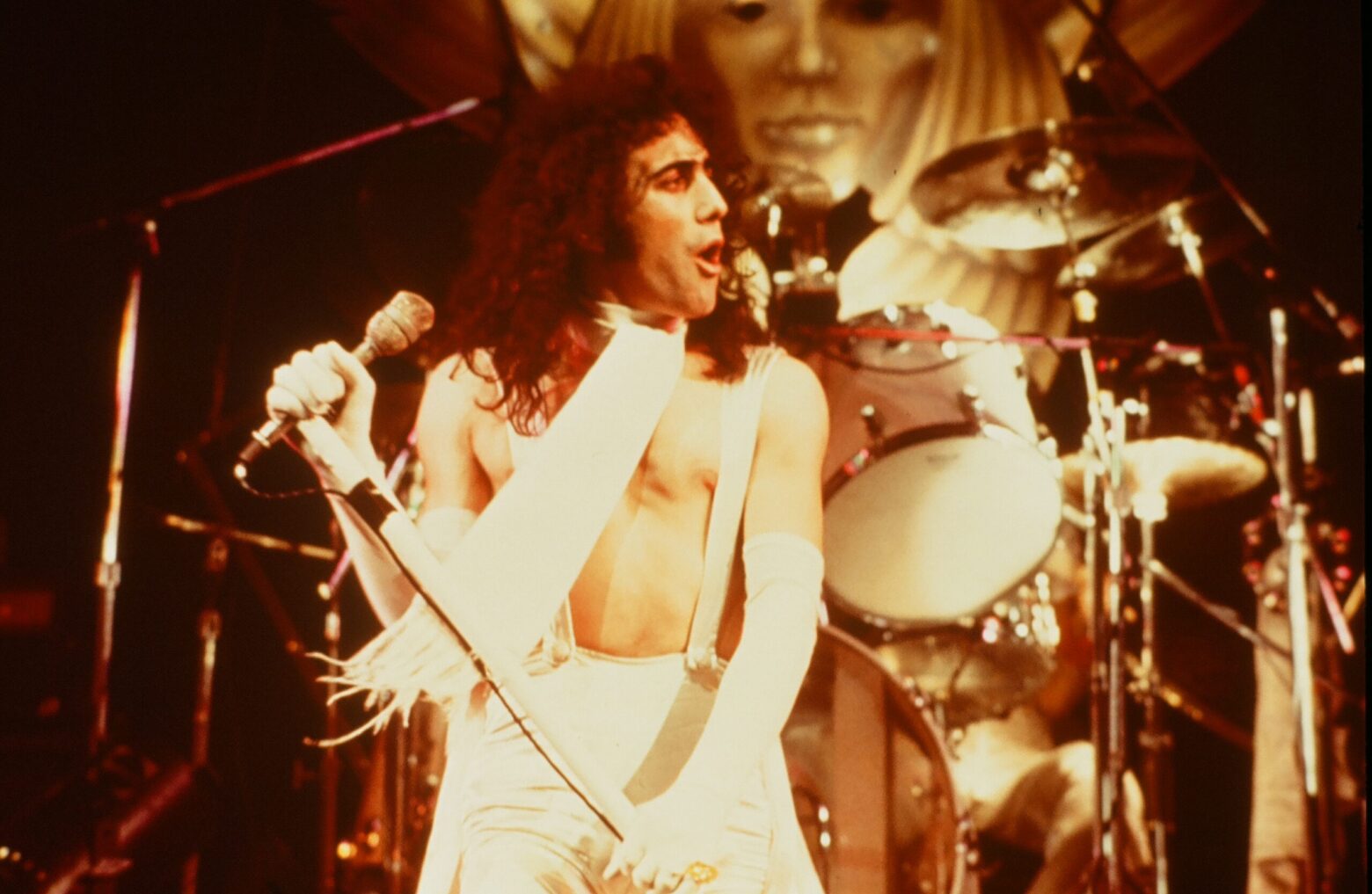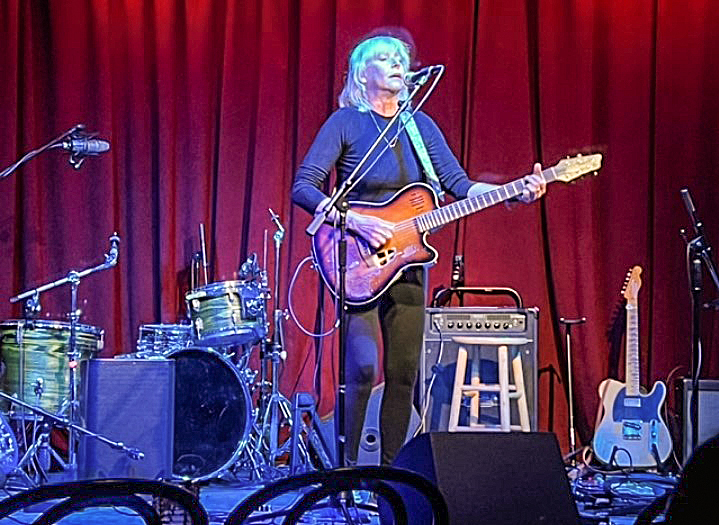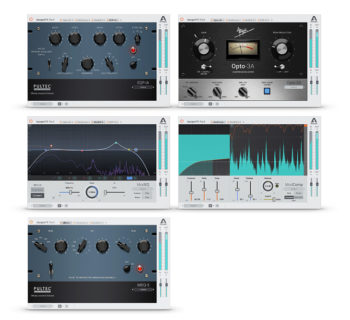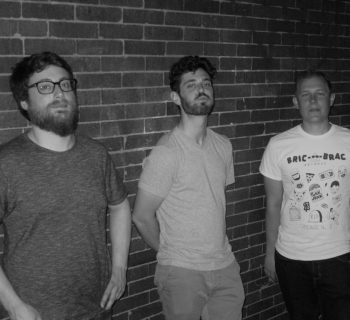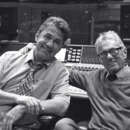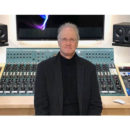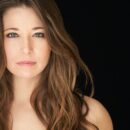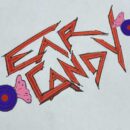PHOTOS BY MATT GRUBB
“Supergroup” is an overused term, and it usually applies to epic, classic rock beasts such as Asia. That said, when you bring together the talent and gorgeous tones of indie pop-rock singers and songwriters Phoebe Bridgers, Lucy Dacus and Julien Baker, and the sum of the parts is as effective as it is with boygenius, the trope does seem oddly appropriate.
The group released its debut, self-titled EP back in the fall of 2018 and it’s taken until now to release a full-length album. They’re all super-busy solo artists and, of course, COVID didn’t help. But it’s certainly been worth the wait. The album is as introspective, devastatingly honest and effortlessly cool as the EP teased, and the harmonies raise goosebumps for days. Music Connection discussed all of that and more with the three artists…
Music Connection: Starting with the background of the group, how did the three of you meet? How familiar were you all with each other’s work before meeting?
Phoebe Bridgers: We all met because we toured with Julien Baker. Lucy and I opened for Julien on the same album cycle. Julien was like, “You guys would love each other,” and then we decided to all tour together. The first time that we were in the same space is the first day that we were a band.
MC: You’re all obviously successful individually—how did the notion of coming together first get raised?
Julien Baker: To elaborate on Phoebe’s answer, originally we thought that we would do one track and a cover of something fun, and put out a 45. Just do a limited run for the tour, and then we ended up gelling with each other’s songwriting in a really special and immediate way. We wrote some songs and had an EP, and we were all of a sudden in a band. That’s the first day we were a band, and we didn’t know it.
MC: The EP came out in 2018, followed by an album of demos in 2020—how did you look back on those tracks when you went away from boygenius? Was it about a moment in time?
PB: I look back on those tracks with a lot of pride. I think how limited we all were at that time, and making space and time for that project, what we created, it’s one of the first magical, greater than the sum of its parts, sort of things that happened to me. It feels like there’s this entity in this band that has been ever present, from the beginning. I’m most proud of this album, and I continue to be the most proud of the next thing that we make. Like, at band practice I’ll be like, ‘Well this is the sickest thing we’ve ever done, this is the coolest thing ever.’”
MC: Were you happy with how the EP was received by fans and critics?
PB: I think so. Because nobody was expecting it, people were pleasantly surprised. I thought it was great to give people an unexpected treat. I think there was a pretense-less reception, and that felt really good. I feel like that’s happening again, because we never made it clear that we would make more music. So, I think people are excited about it.
MC: Why was now the time to get back together and record The Record?
PB: I think COVID really cleared the slate for all of us. When that happened, when our palette was cleared, it was like, ‘What I need is my friends.’ I just think that would have been our first choice thing to do, each individually, if you’d asked. As the first one who said anything, it felt good to have that received with excitement.
MC: Where was it recorded? When? Who with?
JB: We recorded it at Shangri-La in Malibu, California. We recorded it with Catherine Marks, and then another of our friends, Sarah Tudzin, did additional engineering. We’re all fans of Catherine’s work with Manchester Orchestra. My friends who had worked with her told me great things about her. I feel so proud getting to say who played on this record. Barbara Gruska played drums. Melina Duterte played keys and contributed. It’s so neat to be able to pull in all our friends as players. Anna Butterss on bass.
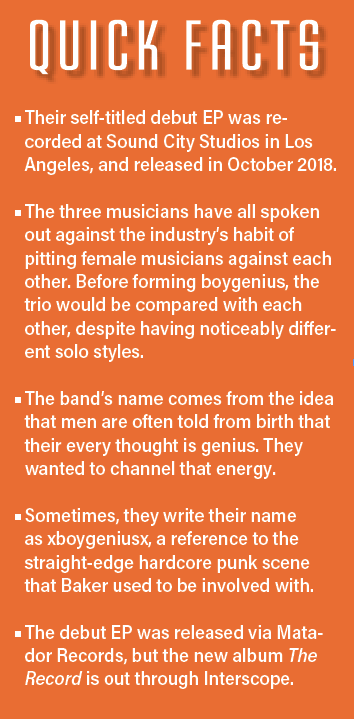
MC: How did you approach your vocal blends when recording? Do the harmonies come naturally? How much work goes into that, particularly when you’re used to working solo?
Lucy Dacus: Yeah, we don’t have to change our voices to sing together. I think it’s just part of why this felt like an obvious thing to do, is that it was naturally nice.
MC: I think we are historically difficult to mix. There aren’t a lot of bands with three people—of course there are a lot. But I think it’s hard to mix three lead vocalists. It’s not just harmony singing, and it takes a different shape per song. I think when we’re all singing together, it’s like a different member of the band. But yeah, it’s easy to sing together. I think it’s just, it was cool how hard it was, it’s validating. It’s actually kinda hard to recreate what happens with us in the room. And I think we succeeded.
JB: You know what? It is really difficult to recreate what happens when we’re all singing together directly. But it was also so, I feel like it was a massive lesson in extra-lingual musical communication, to have to learn how to mix… Like Phoebe, you having the attention to detail to how our voices are mixed, as three, or as one person with the other. Us being interchangeable, and that being a dynamic to play with. It was fun and taught me a lot. I think I learned a lot from you both, in a musical sensibility. That was a gift.
MC: Can you pick one song from the album and take me through the songwriting process? Do you write them individually or bounce them around between you? (I read in the press bio that it works both ways, depending on the song)...
LD: Sure. Like we said, some songs we write separately, but for ones that we write together, someone will be like, ‘I have this idea,’ and often one of us will be like, ‘it’s kinda stupid,’ Or pretend that it’ll be on the record but hedging on it’s dumb. Then the other two will be like, ‘No, this is awesome.’ Most of the time. Maybe not 100 percent but 95 percent.
PB: It keeps my belief strong that y’all are telling me the truth all of the time because of the times that I show something and you’re like, ‘Huh?’ We have honesty with each other and it’s not an insult because I know you believe in my songwriting as good and great and pure.
LD: I think it’s just that we share taste, and so our hit rate for each other is really high. When we miss, it’s not a big deal. Or, sometimes we’ll have an idea that is good but not right, and taking the time and not being satisfied until we get the thing that we’re most proud of, and not settling for something that functions, I think is a priority that we all have. Phoebe will, say, bring an idea and say ‘I don’t know what to do next,’ and then we’ll all separately learn the chords, play it by ourselves, play in the same room, and we did a couple of writing trips together for this record. We’d have the opportunity to say, ‘Come here for a second, and hear this.’ When we felt there was momentum around something, we’d all convene and affirm the things that felt right and scrap the things that felt wrong. Redirect until we got to a destination that felt good.
MC: Is there a growth in sound, style, lyrics since the EP?
PB: I think the core thing about our friendship has been there since day one. It felt like our lives are hard, but our closeness has been easy to cultivate because we all want it. But yeah, that first day was so easy. I have a lot of social anxiety, like everybody else. Also, a lot of anxiety around creating, especially with new people. Julien and I were talking about how bad we are in writing sessions. Like, meeting someone for the first time and trying to record something meaningful. So just like, the most high-pressure environment to be dissipated in the first second of sitting together. Obviously, we’ve gotten closer and had our lives together now. But I think it’s the same in a lot of ways, from the first day.
JB: I might even say it was nice that when we deliberately carved out time to spend with each other in a mode devoted to writing and cultivating ideas, to learn more about Lucy and Phoebe’s process and ultimate desires—the songwriting vernacular they speak in. Because then it’s that much easier to be like, to receive and say to someone, I see the vision and I care about it as much as you. To have no chain of preciousness. I feel very precious with the things I write and where they are getting finished-wise. Getting to be around each others’ work in infancy still remains informative to me as a writer.
MC: Are there any overriding themes/concepts to the album?
LD: I feel like the theme is us. I feel like we’re representing ourselves pretty well. A pretty recent version of who we are, even though we recorded it a year ago and started thinking about writing it even before then, I feel like we’re showing people the latest version of who we are and what we’re thinking about. A lot of the songs are about each other, so letting people in on that relationship a little bit. And then there’s repeated imagery. Like there’s the ocean—we spent a lot of time at the ocean together, so it felt kinda rife with symbolism or just the actual setting. There’s fire and drowning and cars. A bunch of cars.
JB: Lots of motifs, man.
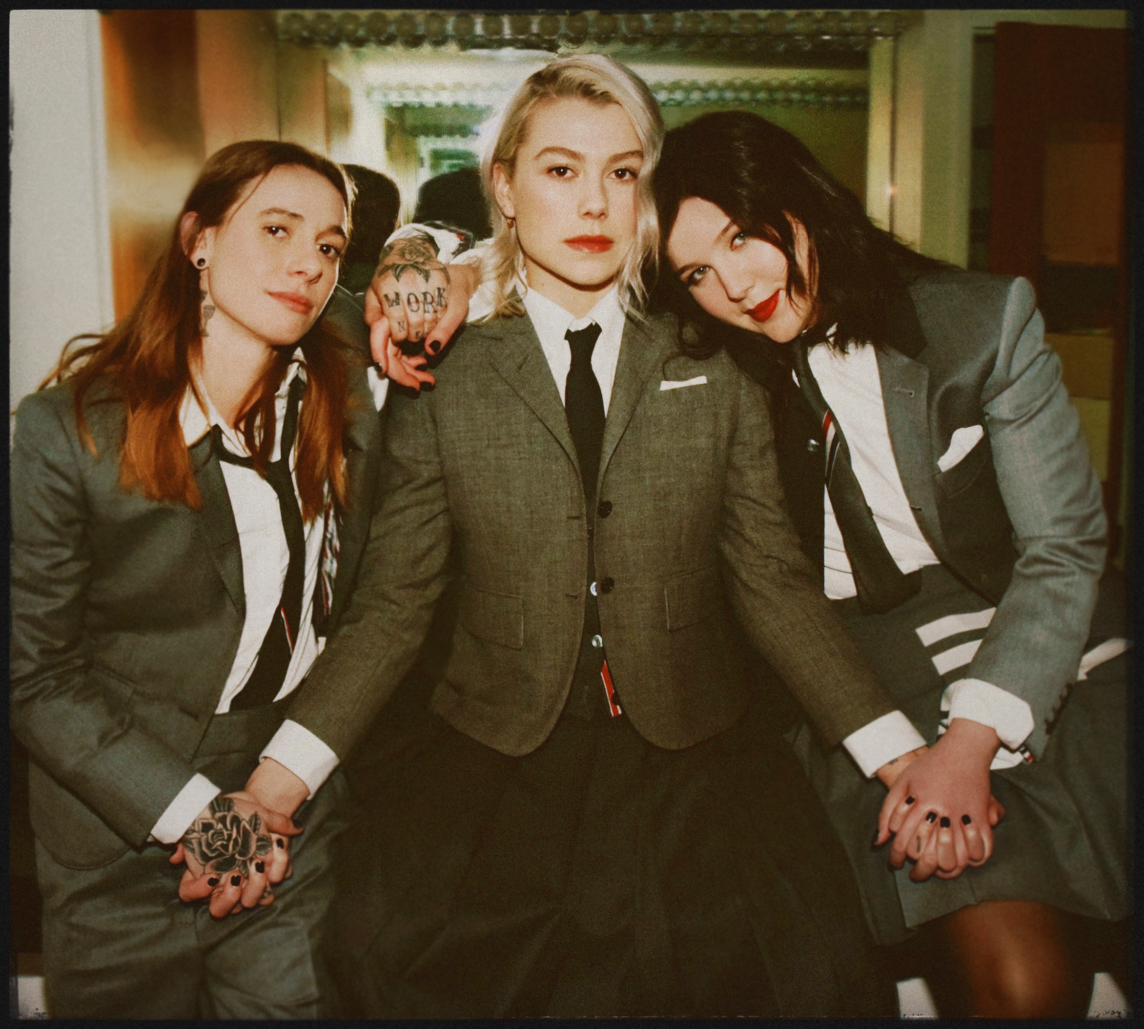
MC: I read that the song “Leonard Cohen” came from a roadtrip listening to Iron & Wine’s “Trapeze Swinger”—can you elaborate on that experience?
PB: I do this thing where I insist that people connect deeply and immediately with all my favorite things. I think they’d both heard that song before, but I was like, ‘Not in the right way!’ So, I put it on in the car, and it was like, ‘I need you to listen to this right now.’
LD: Julien and I both separately noticed that Phoebe got back on the highway in the wrong direction, and that song is 10 minutes long. It’s a highway that doesn’t have that many exits. So, we were just listening and knowing that it was super-important to Phoebe for us to take this in, and once it was finished we reacted about how awesome it was and then we were like, ‘By the way, you’re gonna need to turn around.’ So that added an hour to our drive, which was a really fun hour of the drive, so it’s kind of like, I’m glad that she fucked up because it led to more opportunities to get to know each other.
MC: Why call the record The Record?
LD: We were thinking about these already existing record titles that we thought it would be funny to use, like The White Album or In Rainbows. But we ended up settling on The Record because people have long been asking for it, like ‘Where’s the record?’ But also, that’s what it is. It’s a record of our friendship. And it’s sort of like a time capsule, reporting from the field, of what it’s like to be with each other. It’s recordings of music, but it’s also recordings of this time in our lives together.
MC: Are there organizational issues that need to be ironed out among the performers and their teams when solo artists come together like this? How complicated is that? Any advice about how to do that smoothly?
PB:It definitely flows less naturally. I think that our friendship is so close and easy that having to commodify it, especially when we commodify a lot of ourselves, is complex and the hardest part of the band is the organization, I think. It just isn’t as fun as the rest of it, which is so fun.
MC: What gear do you each use, both in the studio and on stage?
JB: We used an EL251 vocal mic.
PB: When I’m asked about gear, it’s a pop quiz. When I’m recording, I have really instinctual preferences for mic use and gear but I don’t remember the name of everything so I could be like, ‘that one over that one’ but my brain does not remember any of that shit. But there is a Gibson J-45 from the early 60’s which was signed Glen Campbell and owned by Tony Berg that I use on my record. It’s very old and it’s just the most beautiful dead-sounding acoustic guitar ever and I don’t ever want to record with anything else. That was a gift to us from Tony to let us use it during the recording session, but we were all so terrified to pick it up. If it breaks, my records just stop being made. On the flip, there is my baritone, a rubber bridge baritone made by Old Style in L.A., and also my Danelectro baritone that I love. The reverb tank at Shangri-La is amazing.
JB: I will say this about the gear—I imagined that Shangri-La would have all these different amps and we would double-mic everything. We just brought in a Fender Double Twin and mic’ed it. There was an entire room of guitars that we didn’t even know about until the last week of recording, and we didn’t use any of it except for the 12-string electric. But a lot of the mixing and the assembling of what we recorded was just like, I don’t want to overuse this analogy, but not trying to photoshop an apple into an orange. Barb uses this old Italian music school practice snare that has a unique and esoteric tone for the song “True Blue.” So that is a fact about the process that relates to even the title being a record of a time in our lives, with the resources available. Part of recording was leaning into the experience of using the tools at your disposal. Trusting the sound, being experimental.
LD: I used the Glen Campbell guitar like everybody. I tend to use Fender Telecasters because they’re versatile. Hologram pedals. We also used those pocket pianos, the Critter & Guitari ones with the wood buttons. Those are super useful. We used a bunch of Yamaha shitty kids keyboards. Melina had a bunch, Sarah Tudzin had a bunch. Though they are machines, you’d think they’d all sound pretty similar to each other, but they all have their unique sound between models that also are a little bit broken. So, the broken-ness of each of them would sometimes bring a fresh thing to the equation. I also think it’s surprising that we all used the same vocal mic, because we don’t have the same vocal tones.
PB: Mostly I was on that mic, but some of the stuff that went back and retracted was on a U48 from the late ‘50s/early ‘60s. There’s also the Cooper Timecube, that is heavily featured on everything that I make because it’s fucking amazing.
MC: What’s next, both for boygenius and for you all individually?
PB: We’re going to be touring. We have a bunch of non-music videos and photo shoots that all take creativity and effort, that we’re excited to share. But yeah, this year we all blocked off as a boygenius year. Not everything is announced, but we’ll be around.
boygenius’ The Record debuted on March 31.
Go to xboygeniusx.com for more information.
Contact Chloe Walsh, chloe@theoriel.co
